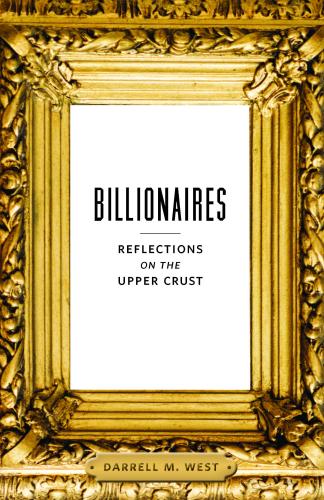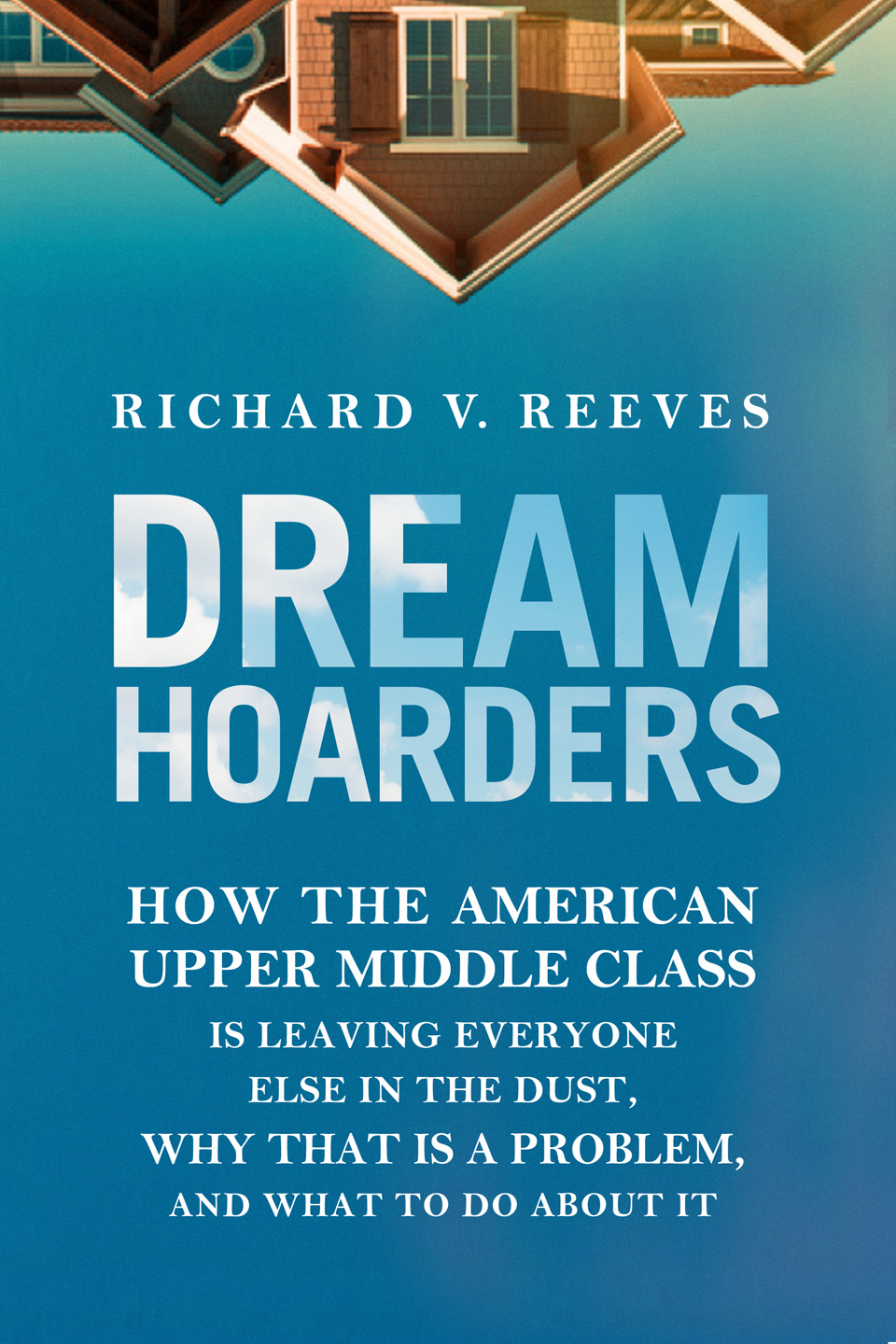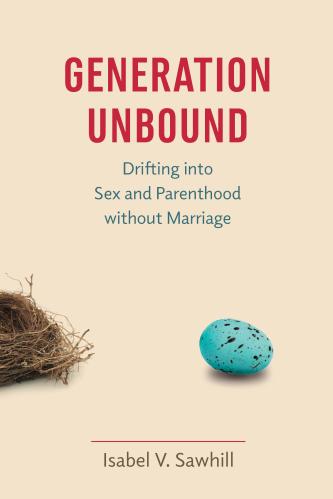


Book
America is becoming a class-based society.
It’s now conventional wisdom to focus on the excesses of the top 1% — especially the top 0.01% — and how the ultra-rich are hoarding income and wealth while incomes for most other Americans are stagnant. But the more important, and widening, gap in American society is between the upper middle class and everyone else.
Reeves defines the upper middle class as those whose incomes are in the top 20 percent of American society. Income isn’t the only way to measure a society, but in a market economy it is crucial because access to money generally determines who gets the best quality education, housing, health care, and other necessary goods and services.
As Reeves shows, the growing separation between the upper middle class and everyone else can be seen in family structure, neighborhoods, attitudes, and lifestyle. Those at the top of the income ladder are becoming more effective at passing on their status to their children, reducing overall social mobility. The result is a fracturing of American society along class lines, not just an economic divide. Upper-middle-class children become upper-middle-class adults.
These trends matter because the separation and perpetuation of the upper middle class corrode prospects for more progressive approaches to policy. Various forms of “opportunity hoarding” among the upper middle class make it harder for others to rise up to the top rung. Examples include zoning laws and schooling, occupational licensing, college application procedures, and the allocation of internships. Upper middle class opportunity hoarding, Reeves argues, results in a less competitive economy as well as a less open society.
Inequality is inevitable and can even be good, within limits. But Reeves argues that society can take effective action to reduce opportunity hoarding and thus promote broader opportunity. This fascinating book shows how American society has become the very class-defined society that earlier Americans rebelled against — and what can be done to restore a more equitable society.
Are You a Dream Hoarder? Play the game to find out.
Videos:
Related Books

Darrell M. West
September 18, 2014

Isabel V. Sawhill
September 25, 2014
An important new perspective on equality and mobility from one of America’s best-informed and most articulate commentators on that topic. Reeves provocatively turns the current policy debate upside down—not “how do we increase upward mobility?” but “how do we increase downward mobility?” Certain to enliven dinner party conversations among America’s upper-middle class elite—so if you are in that group, this book is a must-read.
—Robert D. Putnam, Harvard University, and author of Our Kids: The American Dream in Crisis
We have met the enemy, and he is us: we who were smart enough to pick the right parents and now occupy the high ground in post-industrial America. Richard Reeves and I differ on specifics, but Dream Hoarders rightly gets to the heart of things: if we treasure America’s traditional civic culture and want to see it preserved for future generations, the upper middle class has to recognize how much responsibility it bears for the culture’s plight and act accordingly. He makes that case brilliantly and—a tough act to pull off—engagingly.
—Charles Murray, American Enterprise Institute
Richard Reeves has long been one of the most authoritative, insightful, and sage voices on the big questions gripping modern societies. Here he tackles one of the most urgent—inequality and how to solve it—and comes up with serious answers.
—Jonathan Freedland, The Guardian
Reading Richard Reeves on social mobility is like going for a good walk: he is bracing, head clearing, and ultimately inspiring. With rigor and wit, his new book shows how millions of successful, hard-working Americans, often with the best of intentions, have helped build a society where birth matters more than brilliance. Impassioned, data-driven, and focused on practical solutions, Dream Hoarders is a fine cure for an age of stale, cynical politics.
—David Rennie, The Economist
Recently, scholars and social activists have set off alarm bells about the rising concentration of income among the top 1 percent. Richard Reeves urges us to turn our attention to a wider slice of affluent Americans—the top fifth—and the result is a devastating empirical portrait of damage done to “the bottom eighty.” Reeves implores well-off Americans to press for institutional and policy reforms that would reduce segregation by class and increase intergenerational mobility. This captivating and stirring book is likely to make many of its readers uncomfortable.
—Janet C. Gornick, Professor of Political Science and Sociology, Graduate Center, City University of New York, and Director, Stone Center on Socio-Economic Inequality
Many of us bemoan the damaging effects of economic inequality. But Richard Reeves has done the hard work of identifying how we recreate inequality from generation to generation. Warning: Reeves’s book will challenge some of your assumptions, no matter what your views are. And he shows how innocent or even admirable actions in particular spheres can reinforce existing hierarchies. Dream Hoarders will shake you up, teach you a lot, and make you think much harder.
—E.J. Dionne Jr., author of Why the Right Went Wrong and Our Divided Political Heart
Author
Richard V. Reeves is a senior fellow in Economic Studies and co-director of the Center on Children and Families at the Brookings Institution.
Blame The Top 20 Percent, Not The 1 Percent, Author Argues
Upper Middle Class Privilege
Hoarding the American Dream
Richard Reeves in conversation with David Brooks
Hoarding The American Dream
Why the 20%, and not the 1% are the real problem
Stop Pretending You’re Not Rich
The Hoarding of the American Dream
America sings the postindustrial blues
Has the Democratic Party Gotten Too Rich for Its Own Good?
The Dream Hoarders: How America’s Top 20 Percent Perpetuates Inequality
One Top Economist Weighs In On How We Can Bring Back The American Dream
The Rich Get Richer
It’s not just the 1%. The upper middle class is oppressing everyone else, too
Summer internships are destroying the American Dream
Blame Well-Meaning Parents for Class Conflict
Is it inequality of income we care about — or inequality of opportunity?
We Are the 99 Percent—Except for the Top 20 Percent of Us
Is the upper middle class really hoarding the American Dream?